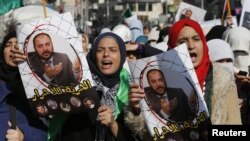A court in Jordan jailed the deputy head of the country's Muslim Brotherhood on Sunday for publicly criticizing the United Arab Emirates, in a verdict his lawyer described as illegal and an attack on free speech.
The military court sentenced Zaki Bani Rsheid to 18 months in prison after convicting him of souring ties with a foreign country, a judicial source said.
Bani Rsheid is the most high-profile political figure in decades to be imprisoned in Jordan, a U.S. ally that has so far been spared the turmoil that has spread across much of the Middle East following the Arab Spring revolts.
Criticized UAE
Bani Rsheid was arrested in November after criticizing the UAE on social media for designating the Brotherhood, which is Jordan's biggest opposition party, as a terrorist group and thereby serving Israeli interests. His arrest was condemned by rights groups.
The UAE is one of Jordan's main financial backers and the two countries are close political allies, both participating in U.S.-led air strikes against Islamic State militants in Syria and Iraq.
Bani Rsheid's lead counsel, Saleh Armouti, said the court was illegal and its verdict a political one designed to “twist the arms of the Islamist movement."
“It's the death of freedom of speech and a sword that hangs over anyone who dares express his personal view," Armouti said.
A government official denied the verdict was politically motivated and said Bani Rsheid was given a fair trial.
Jordan's Muslim Brotherhood, which has substantial grassroots support, said in a statement the verdict “represses freedoms and confiscates the rights of individuals and is proof of the regime's retreat from (political) reforms.”
The organization has ideological ties with the Muslim Brotherhood in Egypt, which Cairo authorities banned in December 2013, but the two groups are not directly affiliated.
Prominent politician
While long tolerating the Brotherhood's presence, Jordan's government arrested several members of the group last year who criticized it for not censuring Israel more following the summer's conflict in Gaza.
But Bani Rsheid is the most prominent politician to be arrested since opposition figure Laith Shubailat, a leading opponent of Jordan's 1994 peace treaty with Israel, was detained in 1995.
Since Bani Rsheid's arrest, some government ministers have suggested authorities adopt a more hardline stance towards the group including revoking its decades-old right to operate as a political party.
Its strongholds are among urban Palestinians and in camps populated by refugees who have fled successive Arab-Israeli wars since 1948.





